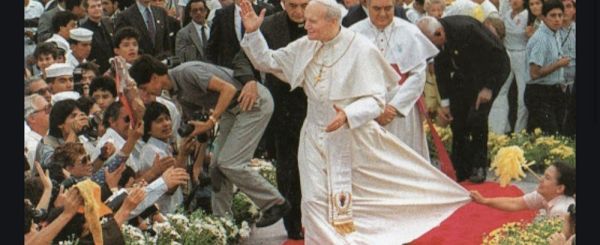We have just read in Luke's Gospel the episode of the hospitality shown to Jesus by Martha and Mary. These two sisters, in the history of Christian spirituality, have been understood as emblematic figures referring, respectively, to action and contemplation: Martha is busy with housework, while Mary sits at Jesus' feet to listen to his words. We can draw two lessons from this Gospel text.
First of all, we should note Jesus' final sentence: "Mary has chosen the better part, which will not be taken away from her." He thus strongly emphasises the fundamental and irreplaceable value that listening to the Word of God has for our existence: it must be our constant point of reference, our light and our strength. But we must listen to it.
We need to know how to be silent, to create spaces of solitude or, better still, of encounter reserved for intimacy with the Lord. We need to know how to contemplate. People today feel a great need not to limit themselves to purely material concerns, but to integrate their technical culture with higher and detoxifying contributions from the world of the spirit. Unfortunately, our daily life risks or even experiences cases, more or less widespread, of inner pollution. But contact with the word of the Lord through faith purifies us, elevates us and gives us new energy.
Therefore, we must always keep before the eyes of our hearts the mystery of love with which God came to meet us in his Son, Jesus Christ: the object of our contemplation is all here, and from here comes our salvation, our redemption from every form of alienation and above all from that of sin. In essence, we are invited to do as the other Mary, the Mother of Jesus, did, who 'treasured all these things and pondered them in her heart' (Lk 2:19). It is on this condition that we will not be one-dimensional human beings, but rich in the same greatness as God.
But there is a second lesson to be learned, and that is that we must never see a contrast between action and contemplation. In fact, we read in the Gospel that it was "Martha" (and not Mary) who welcomed Jesus "into her home." Moreover, today's first reading suggests the harmony between the two: the episode of Abraham's hospitality towards the three mysterious figures sent by the Lord, who, according to an ancient interpretation, are even an image of the Holy Trinity, teaches us that even in our smallest daily tasks we can serve the Lord and be in contact with him. And, since this year marks the 1,500th anniversary of the birth of St. Benedict, let us remember his famous motto: "Pray and work," Ora et labora! These words contain an entire programme: not one of opposition but of synthesis, not of contrast but of fusion between two equally important elements.
This gives us a very concrete lesson, which can be expressed in the form of a question: to what extent are we able to see in contemplation and prayer a moment of authentic energy for our daily commitments? And, on the other hand, to what extent are we able to imbue our work with a leavening communion with the Lord? These questions can serve as an examination of conscience and become a stimulus for a renewal of our daily life, which is both more contemplative and more active.
[Pope John Paul II, homily, 20 July 1980]












